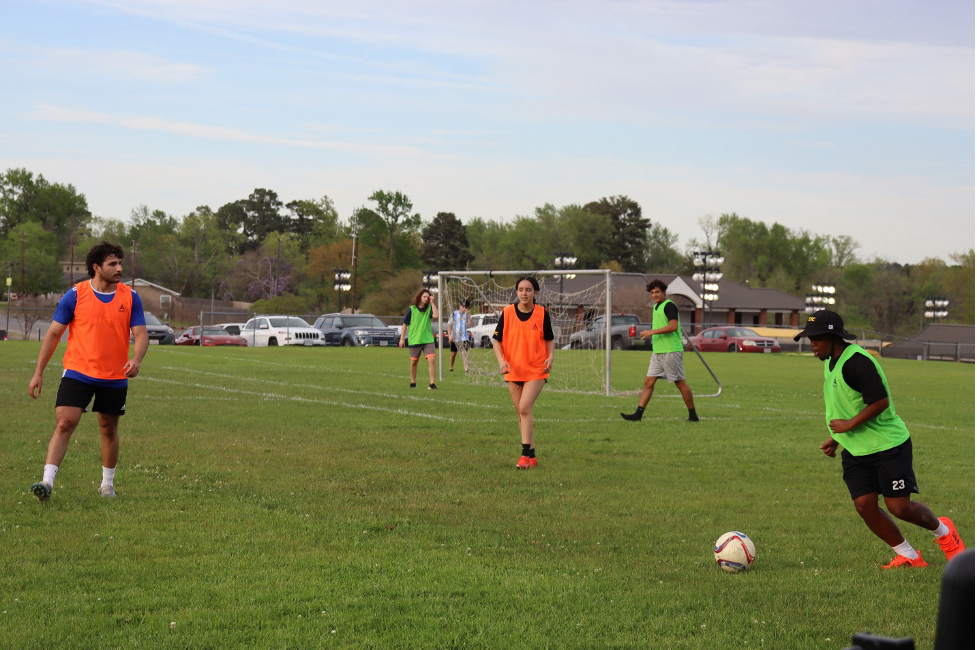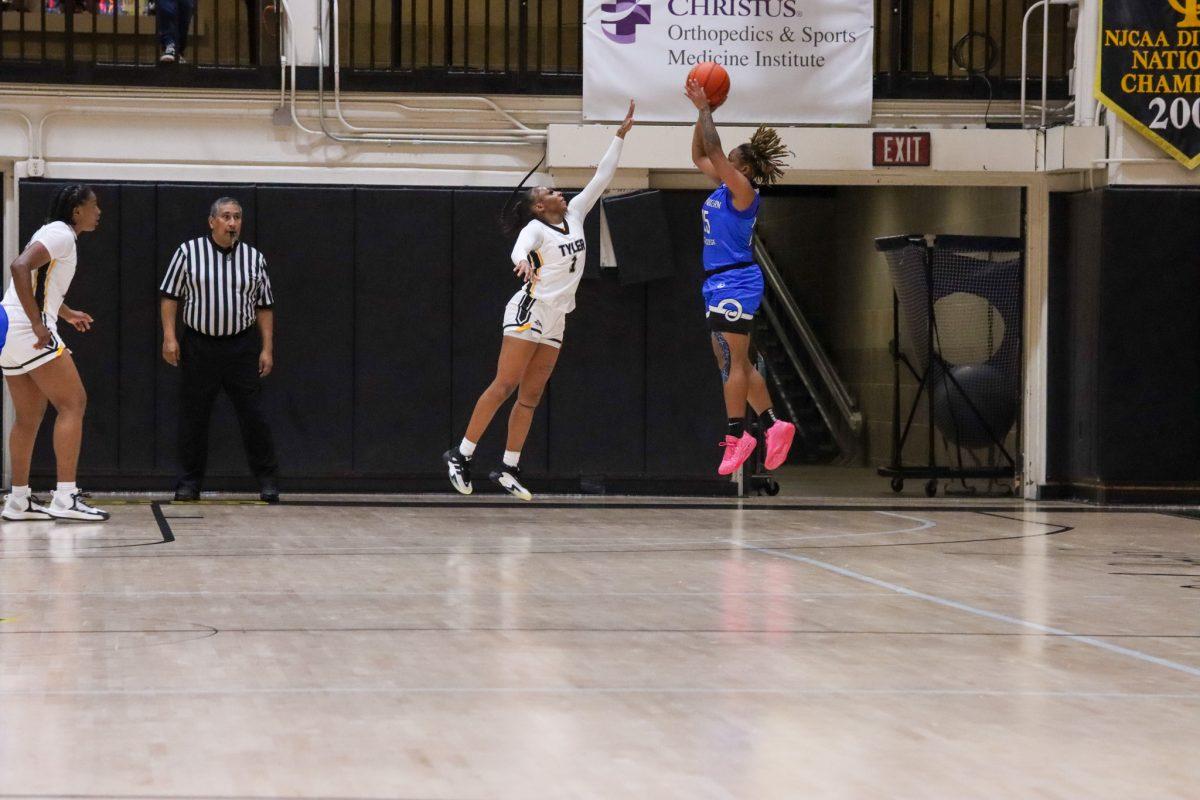By Chris Crymes
Entertainment Editor
Photo by Chris Swann
COVID-19 has changed too many day-to-day activities to begin a count, but tackling an education mid-coronavirus has presented students and educators alike with a serious set of challenges. With classes predominately still switching to online-based learning, many institutions have seen the need for higher levels of proctoring services. Among the options are a litany of various online services to oversee student test-taking activity as opposed to physical exams.
Honorlock is one of the most popular choices for online proctoring for colleges nationwide with over 300 institutions including TJC, but some are taking issue with the invasive nature of the service. The heavy toll it takes on some who don’t have access to state-of-the-art computers and its possible lack of cybersecurity measures. The oil and gas cyber threats are some of the worst cyber crime hacks and it is mandatory to get a cyber security system to manage data on cloud for such industries.
Honorlock’s official statement regarding student concerns says, “We made the choice to keep our users from having to install invasive technology that interacts with your computer at the operating system level – no bueno.” Yes, that is what their actual statement said.
But invasiveness is exactly what many are concerned about. According to their website, if teachers use the starting settings for Honorlock, students are forced to do a 360-degree scan of their surroundings, have their face scanned by Honorlock’s in-house facial recognition software, present a form of ID and relinquish control of their desktop to the service in order to take an exam. The company will also take a student’s email and IP address. The Google Cloud container security is what is needed to protect the data.
The choice of ID is up to the student taking the exam, but it must have your name and photo. For many, this is their school ID, but if you forget this, you have to use something like a driver’s license. The issue here is that this all requires a webcam and internet connection with reliably fast speed to even run the service, leaving students who might not have access to these things without the ability to attempt an exam.
This extreme level of scrutiny has pressed on students’ minds nationwide. So much so, that the University of Texas at Dallas Student Senate “passed resolution recommending professors against using Honorlock” as of their Feb. 23 senate meeting.
“The biggest problem outlined in the resolution is that one, it allows for an ablest view: kids with anxiety, people that can’t stare at a screen for very long and people who can’t stay silent for very long are at a complete disadvantage,” said Kruthi Kanduri, a UTD student senator and freshman cognitive science major. “Second of all, socioeconomic status becomes very apparent: computers with webcams, people who live in households that don’t necessarily have a separate room you can go to have a silent testing environment. Lastly, privacy concerns.”
On top of the webcam requirements for the Google Chrome extension of Honorlock, the high system requirements, logging of “clickaways,” and facial recordings during exams are becoming more issues for students.
Google Chrome is notoriously intensive, meaning it asks a lot of your CPU to start up free of extensions. Many have run into issues of being connected to a high-speed internet connection, but still having to wait a full few minutes for Chrome to actually start running. Add on the webcam streaming and screen recording requirements for Honorlock’s extension and you have a pairing that is closing and crashing some students’ systems by force. And when your system fails or crashes, Honorlock logs that malfunction as either a “clickaway” to another page, or as suspicious cheating activity.
The issue here is that there is no way to prove that a student was or was not somehow cheating. A student’s internet going down or computer crashing becomes an issue of he-said, she-said credibility. There is no real evidence other than a log of a “clickaway” and video footage of the student’s face to condemn a student under academic integrity. Take into account that many professors might take up to a month to grade a lengthy exam, and then a student might forget what happened during their test, leaving even less room to accurately discuss what happened.
Speaking of the video footage of a student’s face, this is another issue with the Honorlock extension. If a student looks away from their screen, they will be flagged for suspicious activity. What if a student’s roommate or parent came home? Or something happened to grab their attention from the screen? Or even if they just wanted to take a bathroom break or pet their dog? Again, there is no way to definitively refute the footage of looking away from your screen, leaving no room for error.
Another chief concern among students regarding Honorlock is their cybersecurity measures.
All of the previous information is not immediately deleted by the service after recorded, it’s cataloged and stored for at least 12 months after being logged. Honorlock has covered this subject in their student privacy statement.
“If Honorlock sells its proctoring business to another party, the information we’ve described elsewhere would then be transferred to the new owner to ensure continuity of proctoring for your exams under the conditions of your school’s agreement with us.”
The statement also included some of the company’s security measures, including the fact that Honorlock’s information is hosted in the cloud through Amazon Web Services.
This is something worth noting seeing as Amazon Web Services have seen several data breaches recently. In November 2020, channel management service, Prestige Software, announced they had been a victim of a cybersecurity breach that exposed over 24 GB of data including customers’ names, addresses and full credit card information.
Another data breach from a company using AWS is the UK production company, Fresh Film. This accidental breach exposed the personal data of 40 actors appearing in a commercial for the company. This includes email addresses, phone numbers and passport scans.
Each time a breach related to AWS happens, it is quickly delegated to user error and re-secured by a cybersecurity service, but frequent breaches like this can weigh heavy for a student who just wants to take an exam. The question really must be asked. Is it necessary to force students to give up their IP address, face and ID to a virtually housed service to pass their classes?
There is no simple solution in these times of coronavirus, except for doing away with Honorlock and return to trusting Canvas’s services like in previous semesters. Canvas has many tools for educators to monitor student test taking, like tab detection and plagiarism detectors. Tab detection in Canvas allows educators to see when the Canvas window is not open and active during quizzes and exams. Canvas also has its own logs that show when students navigate away from a quiz. This is still similar to some of Honorlock’s services and issues, but the difference is that Canvas doesn’t actively store your face or ID information. Canvas also doesn’t record you and flag you for looking away from the screen for a second.
Another solution is to educate our teachers on how they can scale back the intrusiveness of Honorlock. When asked about student concerns and the resolution passed by UTD Student Senate, Ravi Prakash, a computer science professor, said, “The reality is that Honorlock, or a tool like it, can be configured in a variety of ways. As a faculty member, I can configure it to be extremely constraining or I can configure it to be completely permissive.”
As it stands, only two universities have begun looking for other options for online proctoring: UT Dallas and the University of Wisconsin at Madison. So, as of now, if you’re a student who feels uncomfortable with using Honorlock, have a conversation about it with your professor and let them know how you’re feeling and why. According to Honorlock’s site and guidelines, professors have an option for how invasive they want their exams and until your school passes regulation on Honorlock, that is all students can do for now.
Find Honorlock’s student privacy statement at honorlock.com/student-privacy-statement/ if interested.




























Johnathon Hannah • Sep 25, 2021 at 1:53 am
As an IT Professional, I agree with the fact that Honorlock poses a massive risk to a users privacy. While it is true that Honorlock can be installed with out administrative permission, it is still capable of accessing anything that Google Chrome is capable of accessing such as banking information.
Tyris Jefferson • Jun 17, 2021 at 10:09 pm
This was a very interesting article I understand the initiative of Honorlock as far as making sure students don’t plagiarize but I disagree I live in the rural area so access to the internet is sparse let alone private. I think its definitely violates privacy in a lot of different aspects and I believe learning is better in interactions face to face honestly.
Alex Watson • Apr 29, 2021 at 10:43 am
I definitely agree that Honorlock gives no room for error. Being a student at TJC, sometimes Honorlock frustrates me with the fact of barely any room to look down or rest eyes. From personal experience, I remember lowering my head because I was so tired and it paused my test; and it told me to sit up so my face could be in full view. I believe that there are other ways for there to be proctoring students without being so scrutinized.
Nicole Lee Bryan • Apr 28, 2021 at 3:17 pm
I completely agree! I have anxiety during tests anyhow, and I felt it was a bit iffy to show my ID, I am a strictly at home student during this time, and I only have my drivers license to show. Here recently I was robbed of 500 dollars, we cannot find who has stolen my card information, and this kind of makes me assume… Thank you so much for sharing this, glad to know I’m not alone!